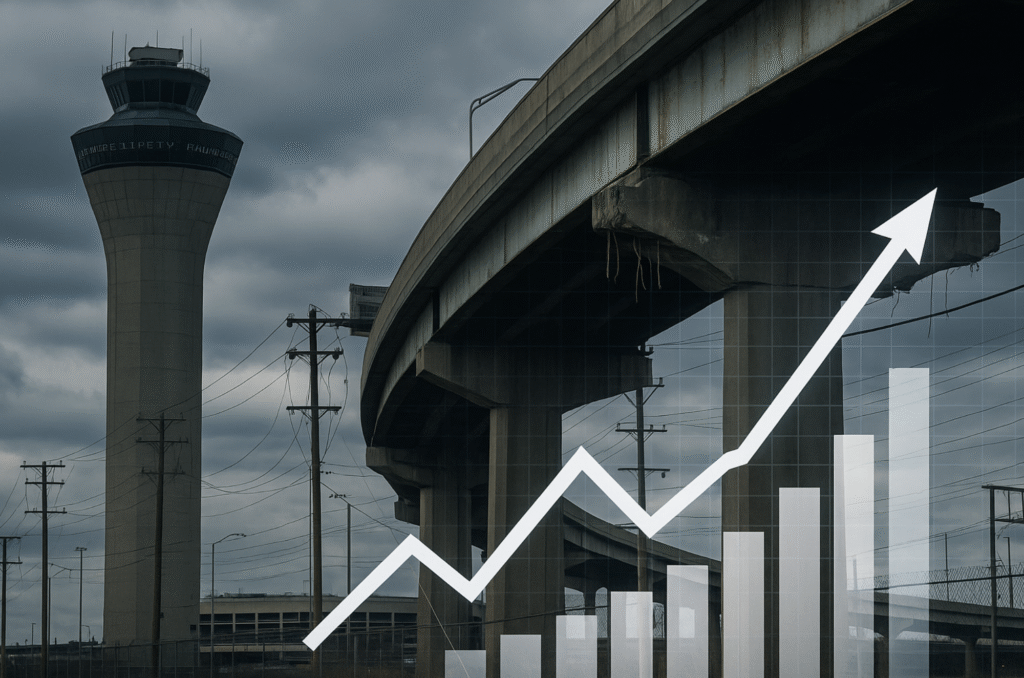
For 90 seconds on a late April morning, one of the busiest airports in America went dark.
Air traffic controllers at Newark Liberty International Airport lost radar and radio contact with every plane in the sky. No communication. No visibility. Just 90 long seconds of silence in a highly coordinated dance where even milliseconds can mean the difference between safety and disaster.
It wasn’t a cyberattack or a software bug—it was aging infrastructure. And it’s not just Newark.
The Infrastructure Time Bomb
America’s air traffic control systems, much like its broader transportation backbone, run on outdated tech and decades-old wiring. Following the Newark incident, the FAA admitted it was rushing to install fiber optic cables to replace old copper lines—a necessary fix, but part of a sprawling $5.2 billion modernization backlog that’s years, not months, from resolution.
And as that future gets built, the reality is this: critical infrastructure is being held together by legacy systems that can’t afford to fail. But they already are.
That’s why the Newark blackout is more than a blip. It’s a symptom of a deeper crisis—and one that’s creating an opening for nimble, tech-forward companies to step in with urgent solutions that don’t require waiting years or spending billions.
From Copper to Cyber-Hardened Overnight
California-based Actelis Networks (NASDAQ: ASNS)* might not be a household name, but its technology is already embedded in some of the most security-sensitive networks in the U.S.—including the Department of Defense.
Rather than replace entire systems, Actelis takes a radically pragmatic approach: it upgrades them in place. Their patented hybrid fiber-copper technology transforms existing infrastructure—whether copper, coax, or fiber—into cyber-hardened, high-speed networks with no operational downtime. It’s a concept tailor-made for environments like airports, where shutting systems down for upgrades simply isn’t an option.
In fact, Actelis recently announced follow-on orders from U.S. military bases and traffic systems in major cities. Their approach sidesteps the binary debate of “rip and replace” versus “stay the course”—and instead delivers fiber-grade performance over whatever infrastructure is already in the ground.
The Flexibility Crisis Is Here
The events at Newark brought one thing into sharp relief: resilience is no longer about future-proofing. It’s about right-now-proofing.
With threats ranging from cyber intrusions to outdated electrical and communication grids, there’s a growing realization that federal and local agencies need solutions that don’t just plan for the future but stabilize the present. That’s where Actelis’ ability to retrofit and cybersecure networks—practically overnight—starts to feel less like a nice-to-have and more like a lifeline.
And the market may be starting to notice.
In March 2025, a Wall Street analyst at Litchfield Hills Research reiterated a Buy rating on Actelis with a $5 price target—nearly 7x its current trading range. The rationale? A combination of gross margin expansion, increasing deployments across North America and Europe, and growing relevance as cyber-physical threats rise across critical infrastructure sectors.
The Setup Few Are Watching
With a sub-$10 million market cap, Actelis isn’t on many institutional radars. But that’s often where the biggest disconnects between relevance and valuation occur.
The company’s core technologies seem to already deployed across defense, transportation, and smart city applications. And as headlines continue to surface about the fragility of America’s infrastructure, the appeal of low-disruption, high-security networking upgrades is likely to grow.
It’s a convergence of need and capability, wrapped in a market that’s just beginning to understand the scale of the modernization challenge ahead.
Read more Articles from The Finance Herald
- EPA Proposes Controversial Rollback of Greenhouse Gas and Mercury Emissions Standards, Igniting Industry and Environmental Debate
- Restoring Accountability: The Case for President Trump’s Dismissal of Fed Chair Jerome Powell
- Tipping Point: Rising Geopolitical Tensions Between Israel and Iran Amid Military Threats
- Federal Authorities Arrest Suspect Linked to Organized Civil Unrest in Los Angeles Amid Rising National Tensions
- The New American Dream: Navigating the Surging Costs of Homeownership Across Major U.S. Cities
Subscribe for updates
* Paid Advertisement Disclaimer & Disclosure: Wall Street Wire™ (owned and operated by Arx Advisory Ltd (the “operator”).) receives an ongoing monthly subscription fee of five thousand united states dollars in cash via bank transfer (since February 5th, 2024 which is ongoing as of the date of publication) from Actelis Networks Inc to produce and distribute this content and additional promotional content and news distributions on various media and social channels. The operator receives additional monthly cash fees for non promotional data and advisory services from Actelis. This content is not financial or investment advice, and the authors are not licensed brokers, dealers or advisors. Please refer to our full disclosure and disclaimer here: https://redditwire.com/terms
